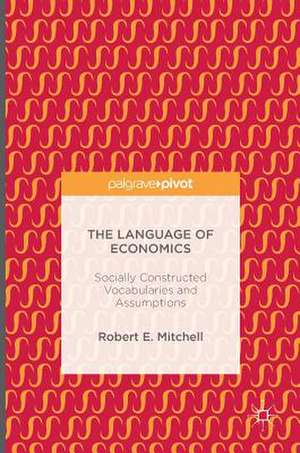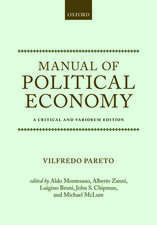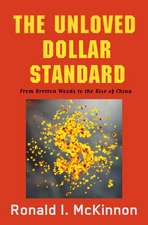The Language of Economics: Socially Constructed Vocabularies and Assumptions
Autor Robert E. Mitchellen Limba Engleză Hardback – 9 aug 2016
Preț: 383.50 lei
Nou
Puncte Express: 575
Preț estimativ în valută:
73.39€ • 76.16$ • 61.34£
73.39€ • 76.16$ • 61.34£
Carte tipărită la comandă
Livrare economică 17-31 martie
Preluare comenzi: 021 569.72.76
Specificații
ISBN-13: 9783319339801
ISBN-10: 331933980X
Pagini: 148
Ilustrații: XX, 131 p.
Dimensiuni: 148 x 210 x 13 mm
Greutate: 0.31 kg
Ediția:1st ed. 2016
Editura: Springer International Publishing
Colecția Palgrave Macmillan
Locul publicării:Cham, Switzerland
ISBN-10: 331933980X
Pagini: 148
Ilustrații: XX, 131 p.
Dimensiuni: 148 x 210 x 13 mm
Greutate: 0.31 kg
Ediția:1st ed. 2016
Editura: Springer International Publishing
Colecția Palgrave Macmillan
Locul publicării:Cham, Switzerland
Cuprins
1 Economists' Epistemological Challenges.- 2 The Trajectory of the First Social Science.- 3 An Overview of Socially Constructed Mental Models and Vocabularies.- 4 From Metaphor to Fact: The Early History of Creating a New Language of Markets & Economies.- 5 Value Judgments Regarding the Meaning of Wealth.- 6 Alternative Values and Mental Models: The Recurring Challenge of Inequality.- 7 The Long-Standing Interest in the Meanings, Causes, and Consequences of Inequality.-
8 Is the Past a Reliable Prologue for the Future of Economics?.
Notă biografică
Robert E. Mitchell is a retired Foreign Service Officer and former Professor of urban and regional studies at Columbia University, the University of California, Berkeley, the Chinese University of Hong Kong, and Florida State University. He also directed two survey research centers, served as executive director of two state-level task forces, and headed a national task force on family policy. He served as a Behavioral Science Adviser for the Near East Bureau of the United States Agency for International Development, followed by long-term Foreign Service posts in Egypt, Yemen, and Guinea-Bissau.
Textul de pe ultima copertă
This Palgrave Pivot demonstrates that the inherited vocabularies of economics and other social sciences contain socially constructed words and theories that bias our very understanding of history and markets, bridging the empirical and moral dimensions of economics in general and inequality in particular. Wealth, GDP, hierarchies, and inequality are socially constructed words infused with moral overtones that academic philosophers and policy analysts have used to raise questions about "fairness" and "justice." This short intellectual and epistemological history explores and elaborates a limited number of key inequality-related terms, concepts, and mental images invented by centuries of economists and others. The author challenges us to question the assumptions made concerning presumably value-free concepts such as inequality, wealth, hierarchies, and the policy goals a nation can be pursuing.
Robert E. Mitchell is a retired Foreign Service Officer and former Professor of urban and regional studies at Columbia University, the University of California, Berkeley, the Chinese University of Hong Kong, and Florida State University. He also directed two survey research centers, served as executive director of two state-level task forces, and headed a national task force on family policy. He served as a Behavioral Science Adviser for the Near East Bureau of the United States Agency for International Development, followed by long-term Foreign Service posts in Egypt, Yemen, and Guinea-Bissau.
Caracteristici
Argues that economic vocabulary and paradigms are not keeping up with economic changes Breaks down social constructs around the words "inequality" and "wealth" Challenges the assumption of value-free economic terms Tracks how human motivations were understood from biblical through modern times













